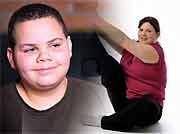
FRIDAY, June 8 (HealthDay News) — While U.S. doctors often urge obese teens to eat better and exercise more, overweight kids headed for obesity seldom get the same medical advice, a new study shows.
That’s important, experts say, because preventing obesity is much easier than dealing with it once it’s there.
In the study, fewer than half of all adolescents were advised to eat a healthful diet by their doctor, and only about a third were also told to get more exercise.
This type of advice was more commonly doled out to obese boys and girls than their normal-weight counterparts, but overweight adolescents — those at highest risk of becoming obese — were counseled much less often.
The bottom line is that “there is still significant room for improvement in terms of the diagnosis, prevention and management of weight issues in children,” said one expert, Dr. Yolandra Hancock, a primary care pediatrician at Children’s National Medical Center in Washington, D.C. She was not involved with the study.
If doctors aren’t helping overweight kids slim down, it’s up to parents to step in, she said.
“If your provider has not brought up weight or body-mass index (BMI), ask how much your child weighs, what their [BMI] is and how it compares to other same-aged kids,” she said. “Once this conversation is initiated, the provider will take the lead.”
BMI is a measurement of body fat based on height and weight. A BMI of 30 is typically considered the threshold for obesity.
The study, led by Dr. Lan Liang of the Agency for Healthcare Research and Quality in Rockville, Md., appears online in advance of print publication in the July issue of Pediatrics.
The researchers looked at data from 2001 to 2007 for nearly 14,000 young people 11 to 17 years old who had been to the doctor’s office at least once in the previous year.
They found that doctors talked with 47 percent of girls and 44 percent of boys about healthy eating, and told 36 percent they should exercise more.
Obese adolescents were twice as likely as normal-weight kids to receive this advice, but overweight teens — those threatened by obesity — were counseled far less than obese boys and girls, the researchers found.
“This is troubling because experts believe that obesity is easier to prevent than to treat, which implies that physician counseling for the overweight but not yet obese may have the greatest potential to prevent obesity later in life,” the researchers concluded.
The rates of childhood obesity in the United States have more than tripled in the past 30 years, and one in three American kids and teens is now overweight or obese. As a result, diseases and conditions normally seen only in adults — high cholesterol, high blood pressure and diabetes — increasingly are diagnosed among children.
Those most likely to receive advice on healthy eating and physical activity lived in wealthier households in the Northeast and had a regular source of medical care and parents with some college education.
Blacks and Hispanics were advised on proper diet more often than whites, and Hispanic teens got activity recommendations more often than whites and blacks. The authors said this might reflect awareness that obesity is a higher risk among minorities.
The new findings predate the release of 2007 guidelines aimed at preventing and treating childhood obesity. The rates of counseling improved toward the end of the study, which may have been a result of publicity for the coming guidelines, the study authors reported.
Dr. Scott Kahan, director of the National Center for Weight and Wellness in Washington, D.C., said few studies of this type have looked at young people. “We have similar data in adults, but this is one of the first studies in adolescents,” he said.
Getting people to change their behavior is no simple task, Kahan said.
“It is a science and art in itself to help empower patients, whether adults or adolescents, to change health behaviors,” he said. “Telling them to eat less and exercise more is not helpful.”
Concerned parents should ask their pediatricians about their child’s weight status, and ask for a referral to a specialist if their child is obese, he said.
More information
For more information on raising healthy, fit kids, check out Let’s Move.

